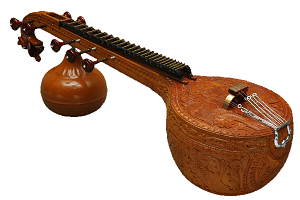Veena is a plucked stringed instrument originating in ancient India, used mainly in Indian classical music. The name is used for several instruments belonging to different families, mainly the Rudra veena (a zither) and the Saraswati veena (a necked bowl lute) but also to other types of plucked string instruments (Mohan veena, Ancient veena etc).
One of early veenas used in India from early times, until the Gupta period and later (this is probably the instrument referred to as veena in a chapter of the Natyasastra dealing with instrumental music) was an instrument of the type of the harp and more precisely of the arched harp. It was played with the strings being kept parallel to the body of the player, with both hands plucking the strings, as shown on Samudragupta’s gold coins. It is not possible to tell exactly the number of strings of the instrument on the coin, but descriptions in early literary sources of an ancient instrument called thesaptatantree veena (7-string veena) seem to coincide generally with the type of instrument represented on the coin.
Veena can be broadly classified into several different types
With frets
- Rudra veena, plucked string instrument used in Hindustani music
- Saraswati veena, plucked string instrument used in Carnatic music
Fretless
- Vichitra veena, plucked string instrument used in Hindustani music
- Chitra veena or gottuvadhyam, plucked string instrument used in Carnatic music
Guitar
Mohan veena, slide guitar
Other
- Yazh, or Shatatantri veena, ancient Indian form of Santoor
- Saptatantri veena
